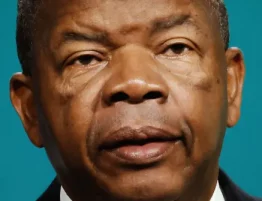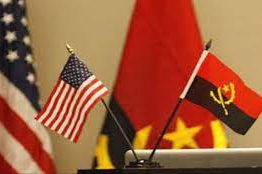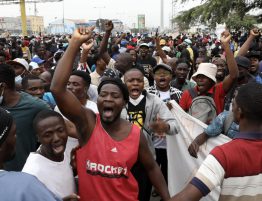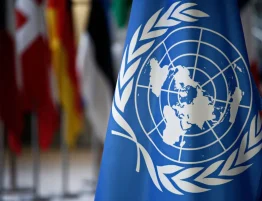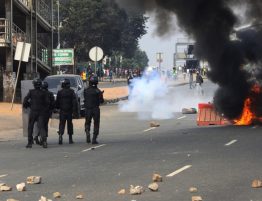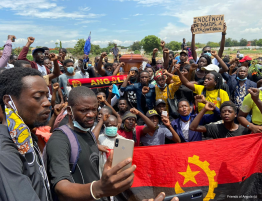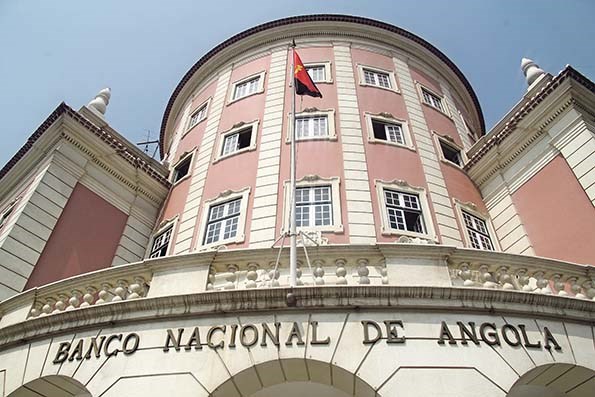
By OCCRP
A group of Angolan government officials and senior bank executives funnelled hundreds of millions of dollars out of the country with little oversight, creating their own private banking network through which they sent the money to Portugal and elsewhere in the European Union, an OCCRP investigation has found.
The network sent at least $324 million through its banks, with most of the funds originating in Angola. In addition, $257 million was found to be held by European companies closely affiliated with these officials.
The scheme was documented in 2016 by Portuguese regulators in two audit reports, which have not previously been made public. In the reports, the banks the group established and used were described as having violated dozens of Portuguese banking regulations. The audit findings, in which the group’s millions were flagged as highly suspicious, were brought to the attention of Portuguese and European Union officials, but the secretive financial network still functions today.
“Portugal’s leadership wasn’t sensitive to the long term damage that laundering this money would do to the country,” said Ana Gomes, a former Portuguese member of the European Parliament.
Aside from hurting Portugal’s reputation, the network continues to corrupt the country, she added.
Gomes said in an interview that its operation required a “spreading web of corruption and tax evasion engineered by many Portuguese lawyers, bankers, accountants, consultants, business people, civil servants, and politicians.”
The ongoing scheme has had even more dire implications for Angola.
Nearly half the southern African nation’s population lives in poverty. Some of the money that disappeared into the network could have been spent on infrastructure, education, or health clinics.
Two men who worked closely with former Angolan President José Eduardo dos Santos, who left office in 2017 under a shroud of corruption allegations, appeared to be the system’s architects: former Vice President Manuel Vicente and his business partner Leopoldino Fragoso do Nascimento, better known as Dino. A retired general and ex-head of presidential communications, Dino is one of Angola’s richest people.
Dino and the Angolan presidency did not respond to a request for comment. Vicente could not be reached for comment.
More than a dozen influential officials and their family members have used the system. For example, companies allegedly associated with Isabel dos Santos, the daughter of the former president, received millions.
Much of the elite group’s wealth has been tied to Sonangol, Angola’s state oil company and the source of at least 75 percent of the country’s public revenues.
“Under Vicente, Sonangol went from being a fairly-focused oil company to becoming a constellation of more than 70 joint ventures and subsidiaries operating on four continents, really a maze of interests based on oil but massively extending beyond the oil sector,” said Ricardo Soares de Oliveira, a professor of African politics at the University of Oxford and an expert on Angola’s banking sector.
Money was also skimmed from other public sources, including reportedly more than $150 million in loans from Angola’s central bank that were never repaid.
The money pipeline started in Angola, where political connections allowed the elites to escape the scrutiny of regulators. The group exerted control over some of the country’s largest lenders, including Banco Africano de Investimentos (BAI), Banco de Negocios Internacional (BNI), and Banco Privado Atlantico (BPA).
The Angolan elites then extended the pipeline by setting up foreign branches of BNI and BPA, and effectively becoming both shareholders and clients of these banks. This allowed them to transfer vast sums of money through a private banking network with little scrutiny.
The foreign branches — two in Portugal and one in Cape Verde — did not implement standard anti-money laundering and terrorist financing controls and failed to carry out any due diligence on clients tagged as suspicious by international regulators. The banks had very few other customers, often making little money or even operating at a loss, suggesting that profitability was not their primary purpose.
Many details about the network are found in the two audit reports by the Bank of Portugal, the country’s central bank. To uncover the vast Angolan-European pipeline, reporters also combed through internal correspondence, confidential documents from investigators that were not included in the audit reports, and public sources such as corporate data. Reporters did not have access to the banks’ client lists, so it was not possible to determine the exact amounts sent or received by specific individuals.
But the fact that Angolan elites were able to send hundreds of millions through their network – and that it continues to operate despite the damning Portuguese audits – raises serious questions about the ability, or willingness, of Portugal and the EU to stop illicit financial flows. The European Central Bank did not respond to requests for comment.
Following the publication of the Luanda Leaks investigation by the International Consortium of Investigative Journalists, which exposed massive corruption by Isabel dos Santos and her associates, regulators are paying renewed attention to Angolan elites in Portugal. Dos Santos has denied the allegations.
First Priority: Get a Bank
The first major component of the Angolan elites’ financial network was Banco Africano de Investimentos (BAI). Several members of the group created the bank in the Angolan capital, Luanda, in 1996, making it the country’s first private lender.
The new bank was buoyed by support from Sonangol, which was its biggest shareholder. Over the years, the relationship between Sonangol and the bank became an important conduit for corruption.
In addition to the more than $300 million the Angolan elites moved through their financial network, OCCRP’s investigation shows that several members of the group received shares in BAI for free. Sonangol transferred just over 40 percent of the bank’s shares to them — yet another way of funnelling the country’s oil wealth into the elites’ pockets. The value of Angolan banks is not publicly listed, but an analysis of similar banks in neighboring countries suggests the shares could have been worth over $150 million in 2017.
Sonangol did not respond to requests for comment.
The group that set up BAI included Vicente, at the time a fast-rising executive at Sonangol. Also involved was Mario Palhares, the former deputy governor of Angola’s central bank, which granted authorization for BAI to become operational.
Palhares was one of several people to hold roles both within BAI and with the regulatory institutions responsible for overseeing the bank. He became BAI president after Aguinaldo Jaime left the role to head the central bank. U.S. investigators later said that Jaime “invoked his authority” at the central bank to improperly send money to a private account. Another of BAI’s initial senior administrators was Joaquim Costa David, who had previously headed Sonangol and later became Minister of Finance.
Within months of its creation, BAI had established correspondent accounts with the U.S. subsidiary of the U.K. banking giant HSBC. Those controlling the bank used this relationship to transfer money to companies and private bank accounts belonging to themselves, their family members, and their associates. They also used BAI to issue credit cards they could use internationally.
By 1998, the bank had become essentially a “credit card” and money laundering vehicle for the elites in Angola, according to a 2010 investigation by the U.S. Senate. Investigators flagged the money sent to the U.S. through BAI as likely of illicit origin, since it belonged to public officials who had no legitimate explanation for such massive incomes, and noted that the bank was run “under the close direction of Sonangol.”
The Cape Verde Connection
A decade after creating BAI, the group began to expand its banking network beyond Angola.
They looked first to the West African island nation of Cape Verde, a former Portuguese colony known as an international tax haven. In 2006, the group set up a bank there called Banco Privado Internacional (BPI), named similarly to Banco Privado Atlantico, an Angolan bank they established the same year.
“Cape Verde was absolutely crucial,” said Gomes, the former European Parliament member. “They used it as one of the steps to diffuse the origin of their money.”
The Cape Verde bank is not known to have any genuine physical presence in the country beyond a mailbox address in the capital, Praia. It operated in almost complete opacity, failing to share any information about its activities and publishing no annual financial reports.
In addition to chairing the similarly-named Angolan bank, Vicente was the largest shareholder in BPI, with a 35 percent stake, according to the Bank of Portugal audit. Palhares held 30 percent. General Joao de Matos, former chief of staff of the Angolan Armed Forces under then-President dos Santos, held 25 percent. Another 10 percent was owned by Jose Garcia Boyol, who was president of the bank while also serving as vice president of another bank controlled by the group.
The shareholders of the Cape Verdean bank frequently exchanged shares with each other in an apparent attempt to avoid regulatory scrutiny. In one such example noted in the audit, the bank asked the country’s central bank for permission to transfer all of Vicente’s shares to Palhares, demonstrating a trusted business relationship between one of Angola’s most senior public officials and one of its leading bankers. In that case, the government declined their request.
The Portuguese audit reports show that money from Angola passed through Cape Verdean accounts to other banks that the group controlled in Portugal and elsewhere in Europe.
Cape Verde’s central bank, responsible for regulating the country’s lenders, did not respond to requests for comment, while BPI could not be reached for comment.
However, the Angolan elites were still exposed to regulators, as the money that passed through Cape Verde went to other financial institutions not under their control.
To solve that problem, they needed to create their own banks in Europe.
European Expansion
In 2014, the group received permission from Portuguese authorities to launch a new bank, BNI Europa, in Lisbon. This was a foreign branch of Banco de Negocios Internacional (BNI), an Angolan lender largely controlled by Palhares, the former central bank official.
BNI Europa’s physical presence amounted to a single desk in one building. By December 2015, the bank still had only 97 authentic clients, mostly Angolan.
To establish a European customer base, the bank partnered with Saving Global, an online German investment system, adding a further 2,400 clients. However, these clients represented just six percent of the money flowing through the bank, and none held accounts there. They used the institution only as a platform to transfer funds. Saving Global did not respond to requests for comment.
In reality, BNI Europa appeared to exist solely as a financial conduit for funds leaving Angola. The bank was “entirely dependent” on BNI, its Angolan parent branch, the auditors said, with 85 percent of the bank’s assets in 2016 originating from there.
Because the money was sent from BNI to its own branch, these transfers were shielded from legal and financial inquiry. Auditors concluded that BNI Europa had no information about the source of these funds.
Moreover, because BNI Europa is almost entirely owned by its Angolan parent bank, the money flowing from one to the other was still providing value to the same shareholders. The funds had not really changed hands, but had now been successfully moved into Europe with little scrutiny.
The Portuguese auditors discovered a dearth of basic due diligence practices at BNI Europa.
investigations/Bni-selected-Pages.jpg
An excerpt from the Bank of Portugal’s audit of BNI Europa. Click to enlarge.
Credit: OCCRP
The bank had no procedures to establish standard information about its customers. It also lacked anti-money laundering tools to vet transactions, some of which the audit described as “enormous,” including those involving politically connected customers.
The bank’s compliance team consisted of one officer who was not allowed to access the accounts of certain clients. For example, the account belonging to the son of the bank’s largest shareholder, Mario Palhares, was off-limits, according to auditors. Palhares’s daughter, Lucia, came on board as a client manager and directly opened accounts for customers that banked with its parent company, BNI. Palhares could not be reached for comment.
After conducting a sample audit of BNI Europa’s clients, investigators found that no substantive information had been collected on about 71 percent of individuals and 100 percent of corporate clients. The bank should have investigated a large majority of the clients included in the sample, auditors said.
BNI Europa also lacked access to accounts opened by its parent bank, essentially placing the bulk of its own financial activity beyond its purview. In a June 30, 2016 letter to auditors, BNI Europa said it was unable to provide records of transactions flowing through its accounts, because only its parent bank had them.
“We offer our sincere apologies,” BNI Europa wrote to auditors. In response to reporters’ requests for comment, a spokeswoman for the bank said: “The nature of our business and the law impose on us a special duty of confidentiality, which prevents Banco BNI Europa from properly responding to your request … Banco BNI Europa has acted with due transparency towards all authorities and notes that, so far as it is aware, no charges, accusations, or fines have been imposed on it in connection with any such allegations.”
BNI did not respond to requests for comment.
Source: http://www.occrp.org/en/investigations/how-angolan-elites-built-a-private-banking-network-to-move-their-riches-Into-the-european-union


